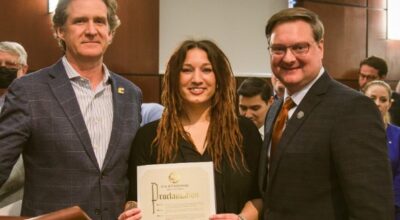
I am being sued in circuit court for nonpayment of a loan that turns out to be a criminal contract illegal in Tennessee. The problem in the case, now on appeal, is Hamilton County circuit court judge Kyle Hedrick, who refuses to dismiss the case with prejudice and has insisted that if he doesn’t have subject matter jurisdiction, the court of appeals in Knoxville will soon enough let him know. The abusive dealings I and a business partner have endured in his court typify the harms done in favor of police and commerce in Tennessee courts.

The courts have upheld the coup of Gov. Bill Lee in March 2020 in the Covid-19 fraud, which includes a communist-style shutdown of the economy as part of a federal military biowarfare operation leveled against the American people, according to my reporting here and at NoogaRadio Network. The courts uphold the fraud of commercial government abuse of travelers in cars and trucks using the roads for private purposes, and not in commerce. They uphold corporate interests in the case Flexibility Capital v. Cupelli et al in which loans are fraudulently disguised as “advance purchases of future receivables.”
Judge Hedrick upholds the operation of the lawsuit against Mr. Cupelli and me, and fails on multiple fronts to let state law control in our protection. The so-called lockdown virtually put my radio station out of business, giving us a reason for not paying the F$16,000 we borrowed. Judge Hedrick rejects the major legal analysis I have done of the case, including this significant brief on the whole matter of fraud and fraud on the court.
Fraud on the court operates when intrinsic fraud enmeddles with the operation of justice and the court. It is a serious, serious breach, and we should have little, if any confidence, in Tennessee c— David Tulis
Answer to plaintiff response to motion to reconsider, challenge to subject matter jurisdiction
Accused enter this answer in support of their oral arguments on this date to demand dismissal of the action against them for the lack of the court’s having subject matter jurisdiction on grounds of it being induced to enforce an unconscionable contract.
- This motion incorporates by reference accuseds’ previous motions and petitions, notably their Nov. 17, 2022, motion to reconsider and a supporting brief, touching on the grounds as to why the court lacks subject matter jurisdiction.
- This answer consummates accuseds’ analysis of the illegality of the Flexibility contract to show, thusly, plaintiff’s lack standing with which to file the lawsuit, not having ground to bring suit, and lacking wherewithal to give the court subject matter jurisdiction over the dispute between the parties.
‘Belated’ assertion
- Plaintiff’s answer, received Dec.15, 2022, objects to the “belatedly asserted” usury and unconscionable contract defense, that accused “did not raise this assertion prior to the hearing on plaintiff’s motion for summary judgment” and thus “have waived this defense.” Movants cite J. & B. Investments v. Surti, 258, S.W. 3d 127 (Tenn.Ct.App. 2007), suggesting that what is commonly known as a “wildcard statute,” T.C.A. § 45–2–601, applicable to state-chartered banks in competition with national banks, has bearing in this case because it allows a 24 percent rate of interest.
- Plaintiff argues that the failure of pro se defendants to proffer a statement of material facts is fatal to their cause, and that its judicial conquest is just and overdue. But that’s like saying a lawsuit by a mobster for extortion payments is just because the shopkeep had agreed to pay. Such a suit is incapable of stirring a court to act for failing to give it subject matter jurisdiction.
- Subject matter jurisdiction involves the court’s lawful authority to adjudicate a controversy. Chapman v. DaVita, Inc., 380 S.W.3d 710, 712 (Tenn.2012); Meighan v. U.S. Sprint Commc’ns Co., 924 S.W.2d 632, 639 (Tenn.1996). Subject matter jurisdiction is conferred by statute or the Tennessee constitution; the parties cannot confer it by appearance, plea, consent, silence, or waiver. In re Estate of Trigg, 368 S.W.3d 483, 489 (Tenn.2012). Any order entered by a court lacking jurisdiction over the subject matter is void. Id. Therefore, subject matter jurisdiction is a threshold inquiry, which may be raised at any time in any court. Id.
- Where subject matter jurisdiction is challenged, the party asserting that subject matter jurisdiction exists must secure it. Redwing v. Catholic Bishop for the Diocese of Memphis, 363 S.W.3d 436, 445 (Tenn.2012). A determination of subject matter jurisdiction involves questions of law; therefore, rulings on such questions are reviewed de novo on appeal, without any presumption of correctness. In re Estate of Trigg, 368 S.W.3d at 489; see also Lovlace v. Copley, 418 S.W.3d 1, 17 (Tenn.2013).
- Accused object that the court is using judicial power to hear the lawsuit and issue summary judgment for plaintiff. The unconscionability and illegality of the loan for money contract, as court and plaintiffs call it, impliedly fail to give the court subject matter jurisdiction. But as accused have not argued subject matter jurisdiction until now, they wish to brief the matter for the record.

Subject matter jurisdiction
- The court lacks subject matter jurisdiction on grounds of (1) unconscionability of the agreement, and, (2) plaintiff’s resultant lack of standing upon which to seek redress in a plea for which relief may be granted.
- Unconscionability and illegality. Accused contend the loan in dispute is illegal because it is not a merchant cash advance, is not an advance purchase of future receivables that would be legal. It is a loan absolutely required to be repaid, and not a good-faith purchase of merchant future receivables.
- Standing. Plaintiffs are seeking to enforce an illegal contract with 208.05 percent annual interest rate, a loan for money.
- The 14-page contract contains 10 pages that describe an advance purchase of future receivables, a form of transaction that is unmolested as free enterprise capitalism under Tennessee law. Three following pages are a “personal guaranty of performance.” These provisions make repayment an “irrevocably, absolutely and unconditionally” a guarantee in the contract (contract p. 11). They convert the entirety of the agreement into a loan for money, as described by plaintiffs in the court record as cited in accuseds’ motion to reconsider, which money loan terms are orally recited by the court in the Nov. 7, 2022, hearing in which the court reads aloud the summary judgment motion and grants relief to Flexibility.
- The transaction as a loan is evidenced in the future receivables part of the contract (pp. 1-10) in reference to a pledge of security, p. 6, including “equipment, general intangibles, instruments, and inventory.” If Flexibility is a buyer of accounts rather than a secured lender, it would not demand recourse against property other than receivables.
- The 14-page contract contains 10 pages that describe an advance purchase of future receivables, a form of transaction that is unmolested as free enterprise capitalism under Tennessee law. Three following pages are a “personal guaranty of performance.” These provisions make repayment an “irrevocably, absolutely and unconditionally” a guarantee in the contract (contract p. 11). They convert the entirety of the agreement into a loan for money, as described by plaintiffs in the court record as cited in accuseds’ motion to reconsider, which money loan terms are orally recited by the court in the Nov. 7, 2022, hearing in which the court reads aloud the summary judgment motion and grants relief to Flexibility.
- Such loan for money, being illegal in Tennessee as violating the 10 percent loan limit at T.C.A. § 47-14-103, and subject to attack under the usury law at T.C.A. § 47-14-110, confers no standing on Flexibility to sue.
- Accused, in keeping with the provision of the usury defense law, set forth the amount of excess at $6,188.
- To obtain standing, plaintiff must show redressability by the court, causal connection between the claimed injury and the challenged conduct, and injury to itself. It must show “distinct, concrete injury in fact” or “particularized injury” Am. C.L. Union of Tennessee v. Darnell, 195 S.W.3d 612, 621 (Tenn. 2006). “[C]onjectural or hypothetical injuries are not sufficient,” Id.
- Accuseds’ nonpayment of an illegal money loan — under aforementioned sets of supervening and original impossibility — is not a distinct and palpable injury sufficient to give standing to Flexibility to sue, nor sufficient ground to give the court subject matter jurisdiction.
- If a party shows a court that it lacks subject matter jurisdiction, its only option appears to be the ministerial function of dismissal.
- The court is asked to review a similar case to this one, CapCall LLC v. Jeremiah Foster, a memorandum regarding Shoot the Moon LLC in which case a Montana-based restaurant chain in U.S. bankruptcy court, district of Montana, gets a fair hearing of the trustee’s claims as against a buyer of advanced receivables, CapCall. The judge uses an eight-part test (see p. 6) devised in an influential 1991 law review article to guide his sifting of a complicated set of facts. A Memorandum disposition resolving competing motions for partial summary judgment, 15pp, is attached as Exhibit No. 1.
- Accused ask for relief from the nominal party in the case, Flexibility Capital; the seeming party in interest is the Cheadle law firm in Nashville, which has a great book of business in Hamilton County and other sessions courts. On Nov. 22, 2022, defendant Tulis and Mrs. Cheadle emailed about calendars; she demurred on one hearing date because she was in Knoxville sessions court with 75 cases. See Exhibit No. 2. The people of Tennessee need protection from this racketeering business that uses sophisticated techniques to prey on small businesses and men and women unable to afford counsel or representation. The adhesion contracts of the kind argued in this case
Flexibility contract put into a calculator with its 208% APR https://www.nerdwallet.com/article/small-business/merchant-cash-advance-mca-calculator
are injected into local economy and free markets. They bristle with noise and jargon, threats and absolutes, and are so complicated that even the purveyors of the loans, and their Tennessee law firm, seem scarcely to understand them. Cheadle and the CEO of Flexibility call the disputed transaction a “loan for money” when they mean to say that, no, it is strictly an advance purchase of future receivables. Turns out that in all these statements about lending money — statements against interest, if you will — they accidentally tell the truth. In this case, despite themselves, the contract is a loan for money with an absolute duty to repay, and with a rate of interest past 10 percent, past 24 percent. They admit the factoring advance receivables agreement — in toto, from p. 1 to p. 14 — is ultimately a loan, though pp. 1-10 lay out a merchant cash advance. They show themselves as predator lenders, as loan sharks. If you don’t pay us 208.05 percent APR usury in daily payments sucked from your account, we’ll eat you alive in a lawsuit, buster. The Cheadles are extorting defendants statewide, including the accused.
Relief sought
- The foregoing indicate the court does not have subject matter jurisdiction to hear this case. The grounds for judicial impotence are the lack of standing on the part of Flexibility Capital and its Cheadle debt collectors/lawyer. They lack standing because the contract they ask the court’s aid in enforcing is unconscionable, illegal, usurious under T.C.A. 47-14-103, made without their signature in bad faith, with evil and fraudulent intent by which they ensnare the honorable Hamilton County circuit court.
- Accused demand said contract be declared void ab initio as against the law of state of Tennessee and against public policy prohibiting usury; and, also,
- That the summary judgment order issued orally at the Nov. 9, 2022, hearing and entered into the record Dec. 5, 2022, be stricken and the case dismissed ministerially with prejudice; and
- That costs for this action be taxed to plaintiff.

